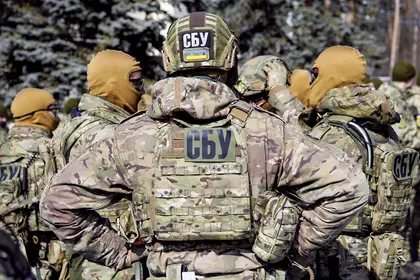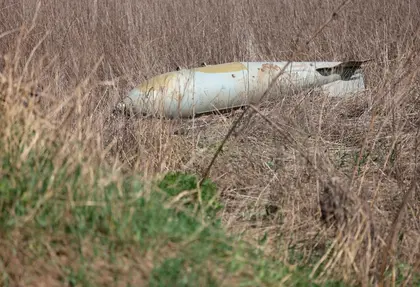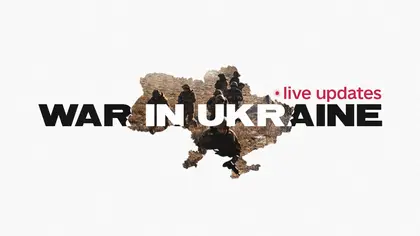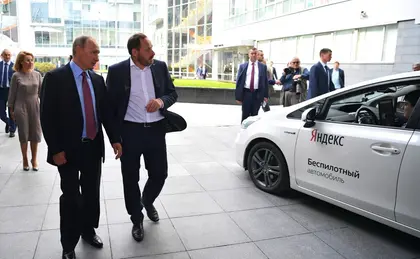Reforming Ukraine’s State Security Service, better known as SBU, was top of Ukrainian President Petro Poroshenko’s to-do list when he took office in May 2014.
It was one of his main campaign pledges: To transform the SBU into a modern and effective Western-style intelligence agency, cut off from its unsavory Soviet-era roots.
Four years later, the SBU remains untouched.
Moreover, the agency whose meaning increased since Russia started its war against Ukraine in 2014, became one of the most criticized government bodies, often accused of corruption, ineffectiveness, and abuse of its immense power.
The Reform Concept for the SBU, a first-step document drafted with the help of the European Union and NATO envoys, has been ping ponging around the Ukrainian bureaucratic maze since 2016.
While the West calls for swifter progress, Ukrainian anti-graft watchdogs say the reason for the years-long delay in SBU reform is Poroshenko’s own reluctance to give up direct presidential control of the powerful service.
Moreover, watchdogs fear Poroshenko’s foot-dragging on reforming the SBU could also mean Ukraine fails to meet its strategic reform deadline to bring its defense and security sector into line with NATO standards by 2020.
Publicly, however, Poroshenko continues to back the reform of the SBU. In March 2017, he said that the National Security and Defense Council will “soon” consider the concept of the reform. It hasn’t happened yet.
A new approach
A direct descendant of the fearsome Soviet-era KGB, the SBU in Ukraine enjoys similar broad powers, and is the country’s dominant secret service.
According to Ukrainian legislation, it is a special law enforcement agency, subordinate to the president, with a broad mandate that includes counter-espionage, counter-terrorism, economic counter-intelligence, and the fight against corruption, smuggling, and organized crime. It can also conduct pre-trial investigations.
But Western envoys say the agency, in terms of powers and functions, has little in common with its European counterparts.
“It’s a fact that the SBU now has more tasks and functions than we see as being natural in a modern, strong democracy,” Ann-Kristin Bjergene, the deputy director of NATO’s Liaison Office in Kyiv, told the Kyiv Post in a recent interview.
NATO envoys, along with the European Union Advisory Mission in Ukraine or EUAM, proposed that the SBU be stripped of its law enforcement functions, making it a purely domestic intelligence agency. Its basic tasks were to be counter-espionage, counter-terrorism, protecting state secrets, and security analysis.
The agency’s other functions were to be handed over to other, newly-created law enforcement agencies; anti-corruption functions would go to the special National Anti-Corruption Bureau or NABU, while the fight against organized and economic crime would have been carried on by the National Police and other law enforcement agencies.
However, streamlining the SBU in this way would also mean a dramatic cut in personnel. The agency currently employs, according to various estimates, between 27,000 and 32,000 employees. Its British counterpart, MI5, has only some 4,000 employees for a nation of 65 million people.
And according to Bjergene, the SBU should be demilitarized and converted into a completely civilian service.
“In future, to become a natural part of the intelligence security family of Europe, they should be something that is recognizable to other services,” the NATO official said. “And (Europe’s services) are not militaristic.”
Most importantly, according to the reform plan, effective democratic control over the SBU was to have been introduced – in particular through a new parliamentary committee vested with the authority to hold the powerful service to account.
“The SBU at that time did agree with us that they needed more oversight,” says Bjergene. “A service can’t be effective unless it is overseen.”
No excuses
But it wasn’t until six months into Poroshenko’s presidency, in January 2015, that the SBU invited NATO and EUAM officials to form an International Advisory Group to formulate the Reform Concept.
The group completed its work as far back as in July 2016. In October 2016, the SBU presented the agreed draft to NATO allies in Brussels.
But then the process stalled. The Reform Concept got lost in the bureaucratic maze between the offices of the SBU and the National Defense and Security Council, which was meant to approve the document.
During a ceremony to mark the 25th anniversary of the SBU’s founding on March 24, 2017, Poroshenko asserted that the NDSC “would review the concept of the reform under best NATO practices.”
Nothing happened, and the West’s patience seemed to be running thin: On July 4, 2017, EU Ambassador to Ukraine Hugues Mingarelli urged Kyiv to start the long-stalled reform as soon as possible.
“It’s important to speedily ensure the SBU concentrates on counter-intelligence and the fight against terrorism, and stops activities that had been delegated to other law enforcement agencies,” Mingarelli said.
But nearly two years after its inception, the Reform Concept remains in limbo. In a response to a Kyiv Post enquiry, the SBU press service said that the service was holding “additional consultations” with NATO and EUAM regarding amendments to the document.
After that, the SBU said, the concept would go to the National Security and Defense Council for consideration and approval.
Meanwhile, time is running out for the reform. Along with the rest of Ukraine’s security and defense sector, the SBU is supposed to conform to NATO standards by the end of 2020, according to the Strategic Defense Bulletin signed by Poroshenko in June 2016. That is less than 1,000 days away.
Kestutis Lancinkas, the head of the EUAM in Kyiv, told the Kyiv Post he sees no valid excuses for the delays.
“I don’t know reasons why this (Reform Concept) just got stuck somewhere in the bureaucratic corridors,” Lancinkas said.
He said the country’s leadership say the reform’s slow progress is due to the fact that Ukraine is at war.
“But from our understanding, if you have prepared a plan and a clear strategy, that’s not an excuse,” Lancinkas said. “The clock is ticking, and two years have passed already. We’d like to see more tangible results and steps.”
Together with his NATO colleagues, the EUAM mission is pinning hopes on the pending law on National Security of Ukraine that was submitted to the parliament on Feb. 28 and passed first reading on April 5. The draft bill foresaw the creation of a specialized parliamentary committee to conduct democratic civilian oversight of all Ukraine security and defense agencies.
But the SBU was not included in the list of agencies to be overseen by the committee.
In response, Lancinkas, together with EU delegation head Mingarelli, NATO’s top representative in Kyiv Alexander Vinnikov, and U.S. Ambassador Marie Yovanovitch, on March 15 wrote to Poroshenko, Verkhovna Rada Speaker Andriy Parubiy and National Security and Defense Council Chairman Oleksandr Turchynov warning that removing the SBU from parliamentary oversight, which was a “fundamental goal and requirement,” would “fall far outside the mainstream of EU and NATO practices in this field.”
The letter worked; on April 5, Turchynov asserted that the SBU would be subject to parliamentary oversight under the new legislation.
According to Poroshenko himself, it is the National Security draft law that will become a game changer for the SBU reform when ultimately signed into force.
Masterminded by his administration, the act leaves the SBU with a mandate that in general meets the Western demands: counter-espionage, anti-terror activities, cybersecurity, state secrets and human rights protection. It will also introduce the parliamentary control of the SBU.
“From my perspective, similarly with the opinion of our partners in NATO nations, that is important for ensuring the complete compatibility of (the National Security draft law) with NATO standards,” Poroshenko said on March 24.
True reason
Nonetheless, the Independent Defense Anti-Corruption Committee, a defense anti-graft watchdog, believes that the true reason for stalling the SBU’s transformation may be corruption.
Olena Tregub, the watchdog’s secretary general, says the biggest problem is that apart from cutting the SBU staff in half, Western advisers demand the elimination of the SBU’s main directorate for organized crime, more commonly known as Directorate K.
“Both civilian society and our Western partners agree this function is irrelevant to the SBU,” Tregub says.
“However, it is the economic cases from which corrupt SBU officials make fraudulent earnings,” Tregub added. “Naturally, there is no political will to reform this directorate and thus lose those numerous opportunities for corruption,” said Tregub.
She also agreed that the pending National Security Act, if passed prior to the NATO summit held in Brussels on July 11-12, could improve the situation by enshrining Western-supported changes in the law.
“But the problem here is that the law’s transitional provisions will take effect only in December, and the country will plunge into a new electoral campaign for the next presidential elections in May 2019,” Tregub said. “Who will take care of conducting the reform then?”
Valentyn Nalyvaichenko, who chaired the SBU in 2006-2010 and in 2014-2015, and who was eventually fired by Poroshenko, says the president was reluctant to curtail the SBU’s power right from the start.
“The president lacks the political will to close Directorate K,” Nalyvaichenko told the Kyiv Post.
“Under new legislation, (the directorate’s) main functions – fighting corruption and organized crime – were handed over to the NABU and partially to the police long ago. The directorate’s personnel, databases and equipment could have gone to the NABU and the police, after proper vetting.”
Nalyvaichenko said that given the threats Ukraine faces, the SBU should become a purely counter-espionage agency, with an anti-terror center that would be exclusively responsible for combatting hostile Russian intelligence forces and the terrorism threat within the country.
Nevertheless, he says, there was no political will to change the SBU in 2015, when he was in office, or in 2016, when the Reform Concept was proposed.
“And there is still no will today, in 2018,” he added.
You can also highlight the text and press Ctrl + Enter







Comments (0)